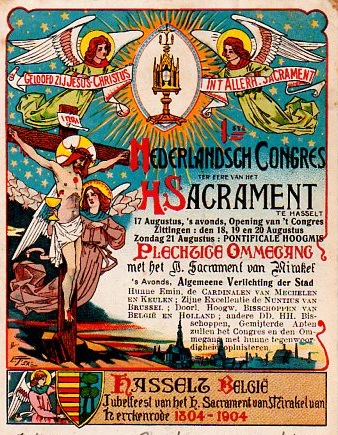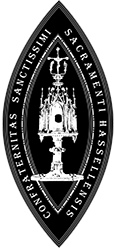Meaning of the Sacrament of Miracle of Herkenrode?
The bleeding Host of Herkenrode, as any Eucharistic Miracle, can not be evaluated outside the context of the deep meaning of the Eucharist for Catholics. Catholics believe the bread and wine transform during the Eucharist in the Body and Blood of Jesus Christ. This believe of the first Christians in the real presence of Christ (the realis praesentia) was made an article of the faith, a dogma, in the Lateran Concile in 1215.
In first place the bleeding of the Host is the expression of the faith that our Lord is really present in the Host. Without this faith the bleeding Host makes no sense. More important, even when we name the bleeding Host the ‘Sacrament of Miracle’, the greatest miracle is the Eucharist, in which Christ confides Himself to the hands of humans and offers Himself.
Secondly, the bleeding Host refers to the blood Jesus Christ gave for the redemption of humankind. It is His sign of love for the people, made visible on the cross, that we remember in every Eucharist. In the Gospel of John Jesus says: ‘Greater love has no one than this: to lay down one’s life for one’s friends.’ John 15,13.
Finally, this bleeding Host is also a confirmation for believers. The Eucharistic miracle is an exceptional grace from God to the believers to grow in their faith.
What is a confraternity of the Holy Sacrament?
From the 16th century onward, the Holy Catholic Church emphasizes the real presence of Christ in the Eucharist. In all parishes associations are created to encourage the devotion: hours of adoration, Corpus Christi processions, Eucharistic vespers, etc. Especially so in the Prince-Bishopric of Liége, where Saint Juliana of Cornillon founded the Feast of Corpus Christi.
In the whole diocese a scheme was made to have adoration throughout all parishes during whole the year. In Hasselt, the Confraternity of the Holy Sacrament was erected in 1713. After the relocation of the Sacrament of Miracle to the St Quentin Cathedral in 1804, she fully participated in organizing the remembrance of this miracle. Today the Confraternity has its Holy Hour on the first Thursday at 3 pm.

Feast of the Holy Sacrament?
After the sacking of the former Abbey of Herkenrode, after the revolution of Liège in 1896, and the relocation of the Host tot he Cathedral, great feasts were held in Hasselt every 25 years. These feasts attracted ten thousands of people to Hasselt, with large processions and public decorations on the theme of the Eucharist. In 1904 the first Eucharistic congress in dutch was held. Thousands of people participated in the processions, with also the Blessed Father Valentinus Paquay. For three days ten thousands of people visited Hasselt at its best.

What is the Eucharist?
The Eucharist is not a human invention. It was a gift of Jesus Christ to his disciples on the evening before He died on the Cross, and He celebrated the Last Supper. In this way He wanted that the offer He made on the Cross, and that is the source of new life for whole mankind, to long forever and to be in a special way with His people. Catholics celebrate the Mass because Jesus has asked them so. On the Last Supper He asked his disciples to remember Him like this, so that He would be really present among them in the breaking of the bread. On the Last Supper He said that the bread was his Body and the wine his Blood.
It is the deep conviction of Catholics that God involves Himself in His creation. He is nor a distant nor detached God, who doesn’t care for his people. That is why His Son became man. But also today He wants to be with us in His Son Jesus Christ, trough the Eucharist.
Even if a priest celebrates Mass, Catholics still believe that in the Eucharist it is Christ that speaks to them in the Living word of the Gospel and that He breaks the bread and sheds the wine to gift His life to us. This happens in the power of the Holy Ghost who transforms the bread and wine into the living Body and Blood of the Lord.
By eating the Host, the Body of Christ, we are personally united with Jesus Christ.
What is Eucharistic adoration?
Eucharistic adoration is firmly linked with the celebration of Mass. All wine that is used in the Eucharist, is also consummated during Mass. It is different with the Host. What is left behind, is kept in the Tabernacle in a place of honor.
Because the presence of Jesus Christ in the consecrated Host does not stop when the Eucharist is finished, He stays present in the Host.
In the Eucharistic adoration this Host is exposed. Catholics adore the bread, because is has become the living body of Jesus Christ. Eucharistic adoration is a special form of praying, that has to be understood in the context of the Eucharist.
In the Eucharistic adoration we encounter Christ, we pray to Him and we bring Him honor.
E.H. Jan Philippe



